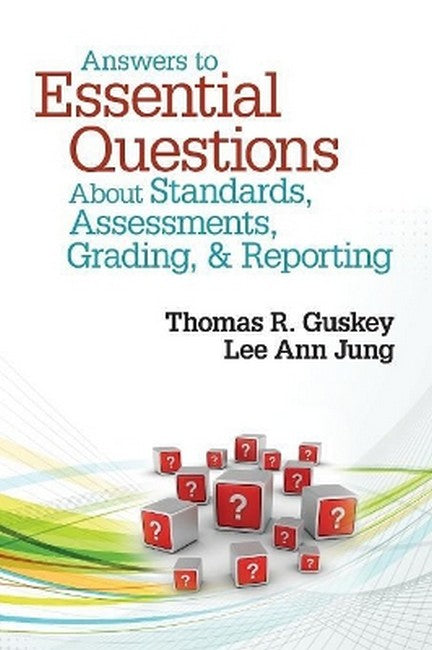Thomas R. Guskey, PhD, is Professor Emeritus in the College of Education at the University of Kentucky. A graduate of the University of Chicago's renowned Measurement, Evaluation, and Statistical Analysis (MESA) program, he began his career in education as a middle school teacher, served as an administrator in the Chicago Public Schools, and was the first Director of the Center for the Improvement of Teaching and Learning, a national educational research center. He is the author/editor of twenty-seven books and over three hundred articles published in prominent research journals as well as Educational Leadership, Kappan, and The School Administrator. Dr. Guskey served on the Policy Research Team of the National Commission on Teaching and America's Future, and on the task force to develop the National Standards for Professional Development. He was named a Fellow in the American Educational Research Association and was awarded the Association's prestigious Relating Research to Practice Award. He was also awarded Learning Forward's Outstanding Contribution to the Field Award and Phi Delta Kappan's Distinguished Educator Award. Perhaps most unique, in the 158-year history of his undergraduate institution, Thiel College, he is one of only three graduates to receive the Outstanding Alumnus Award and be inducted into the Thiel College Athletic Hall of Fame. His most recent books include Implementing Mastery Learning (2023), Instructional Feedback: The Power, the Promise, the Practice (with Smith & Lipnevich, 2023); Get Set, Go! Creating Successful Grading and Reporting Systems (2020), What We Know About Grading (with Brookhart, 2019), and On Your Mark: Challenging the Conventions of Grading and Reporting (2015). He may be contacted by email at guskey@uky.edu, Twitter at @tguskey, or at www.tguskey.com. Lee Ann Jung,PhD, is founder of Lead Inclusion, Clinical Professor at San Diego State University, and a consultant to schools worldwide. A former special education teacher and administrator, Lee Ann now spends her time in schools, working shoulder-to-shoulder with teams in their efforts to improve systems and practice. She has consulted with schools in more than 30 countries and throughout the United States in the areas of universal design for learning, inclusion, intervention, and mastery assessment and grading. Lee Ann is the author of 7 books, numerous journal articles and book chapters on inclusion, universal design, and assessment. She serves on the advisory board for Mastery Transcript Consortium, as section editor of the Routledge Encyclopedia of Education, and on the editorial board member for several professional journals. In her community, Lee Ann is a board member for Life Adventure Center, a local nonprofit with a mission of healing for those who have experienced trauma. Bring Lee Ann Jung to your school or district! Learn more at LeadInclusion.org
Request Academic Copy
Please copy the ISBN for submitting review copy form
Description
Acknowledgments About the Authors Preface: The Nature of Essential Questions Part I: Standards 1. What are Standards? 2. Are Standards a New Idea in Education? 3. Why Do Some People Oppose Standards? Part II: Assessments 4. What Is Assessment? 5. What Is the Difference Between Assessments and Tests? 6. What Is Formative Assessment? 7. Why Are Formative Assessments Important? 8. What Are Common Formative Assessments? 9. What Is Summative Assessment? 10. What Is High-Stakes Assessment? 11. What Are Instructionally Sensitive and Instructionally Insensitive Assessments? 12. How Do Assessments for Learning Differ From Assessments of Learning? 13. Do Formative Assessments Improve Student Learning? Part III: Grading 14. What Are Grades? 15. What Is the Purpose of Grading? 16. Are Grades Essential to Teaching and Learning? 17. Why Are the First Grades Assigned So Important? 18. Do Low Grades Prompt Students to Try Harder? 19. Why Is Setting Percentage Cut-Offs for Grades an Arbitrary Process? 20. What Is Wrong With Grading on the Curve? Part IV: Reporting 21. What Criteria Do Teachers Use in Assigning Grades? 22. What Is Standards-Based Grading and Reporting? 23. Why Do Some Parents Have Concerns About Standards-Based Grading and Reporting? 24. If Schools Implement Standards-Based Grading, Will the Grades Assigned to Students Likely Go Up or Down? 25. What Is the Most Important First Step in Implementing Standards-Based Grading? 26. What Is the Best Way to Inform Parents About Moving to Standards-Based Grading? 27. What Is the Best Way to Encourage Parents to Make Comments on the Report Card? 28. Will Standards-Based Grading Improve Student Learning? Part V: Grading and Reporting for Exceptional and Struggling Learners 29. Who are Exceptional and Struggling Learners? 30. How Do We Assign Grades to Exceptional and Struggling Learners Who Require Modifications? 31. What Is the Difference Between Accommodations and Modifications? 32. How Do We Legally Report Grades for Exceptional and Struggling Learners on Report Cards and Transcripts? 33. Do High School Students Requiring Modifications Receive Course Credit Toward a Diploma? Do Modifications Make a Student Ineligible for Extracurricular Activities, Such as Interscholastic Athletics? Summary and Conclusions Index

